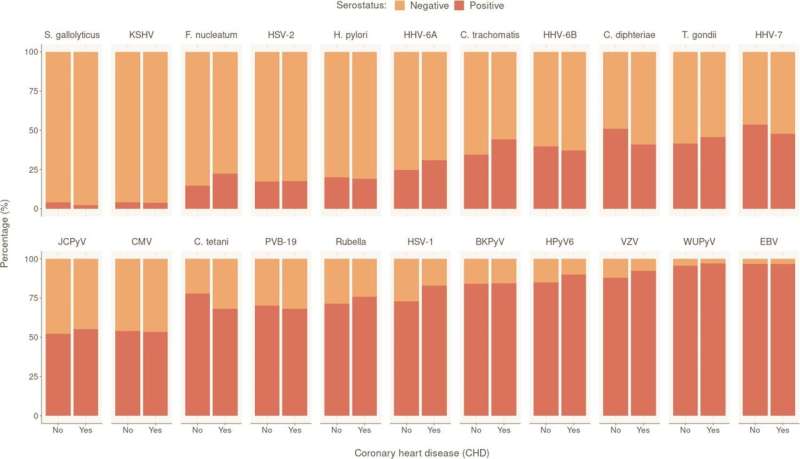This article has been reviewed according to Science X's editorial process and policies. Editors have highlighted the following attributes while ensuring the content's credibility:
fact-checked
peer-reviewed publication
trusted source
proofread
Oral bacteria may increase heart disease risk

Infection with a bacterium that causes gum disease and bad breath may increase the risk of heart disease, shows a study published today in eLife.
The study suggests another potential risk factor that physicians might screen for to identify individuals at risk of heart disease. It may also indicate that treatments for colonization or infection with the oral bacterium Fusobacterium nucleatum may help reduce heart disease risk.
A combination of genetic and environmental risk factors contributes to heart disease, which is responsible for about one-third of all deaths worldwide. A build-up of plaque in the arteries that supply the heart with blood causes coronary heart disease—the most common type of heart disease—and can also lead to blockages that cause heart attacks. Previous studies have linked certain infections to an increased risk of plaque build-up.
"Although enormous progress has been made in understanding how coronary heart disease develops, our understanding of how infections, inflammation, and genetic risk factors contribute is still incomplete," says lead author Flavia Hodel, former Ph.D. student at the School of Life Sciences of EPFL, Switzerland. "We wanted to help fill some of the gaps in our understanding of coronary heart disease by taking a more comprehensive look at the role of infections."
Hodel and colleagues analyzed genetic information, health data, and blood samples from a subset of 3,459 people who participated in the CoLaus|PsyCoLaus Study—a Swiss population-based cohort. Of the 3,459 participants, around 6% experienced a heart attack or another harmful cardiovascular event during the 12-year follow-up period. The team tested participants' blood samples for the presence of antibodies against 15 viruses, six bacteria, and one parasite.
Once the authors adjusted the results for known cardiovascular risk factors, they found that antibodies against F. nucleatum, a sign of previous or current infection by the bacterium, were linked with a slightly increased risk of a cardiovascular event.
"F. nucleatum might contribute to cardiovascular risk through increased systemic inflammation due to bacterial presence in the mouth, or through direct colonization of the arterial walls or plaque lining the arterial walls," Hodel explains.
The authors also confirmed that individuals with high genetic risk scores for coronary heart disease are at elevated risk for cardiovascular events, as previous studies have shown.
If future studies confirm the link between F. nucleatum and heart disease, the authors say it may lead to new approaches to identifying those at risk or preventing cardiovascular events.
"Our study adds to growing evidence that inflammation triggered by infections may contribute to the development of coronary heart disease and increase the risk of a heart attack," concludes senior author Jacques Fellay, a professor at the School of Life Sciences, EPFL, and head of the Precision Medicine Unit at Lausanne University Hospital and the University of Lausanne, Switzerland.
"Our results may lead to new ways of identifying high-risk individuals or lay the groundwork for studies of preventive interventions that treat F. nucleatum infections to protect the heart."
More information: Flavia Hodel et al, Associations of genetic and infectious risk factors with coronary heart disease, eLife (2023). DOI: 10.7554/eLife.79742



















